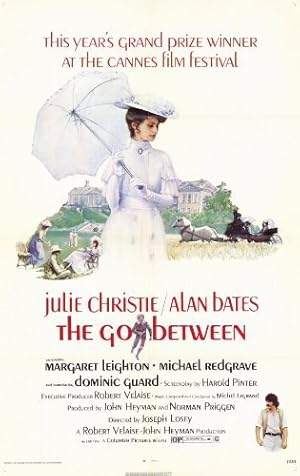
The Go-Between Page #3
- GP
- Year:
- 1971
- 116 min
- 239 Views
in your heart to the Lord.
Giving thanks always for all things.
Let us pray.
Keep us, we beseech Thee oh Lord,
with Thy perpetual mercy.
And because the frailty of man,
without Thee, cannot but fall,
keep us ever, by Thy help,
from all things hurtful
and lead us to all things profitable
to our salvation,
through Jesus Christ, our Lord.
Amen.
More sugar ?
Now, everybody, let us decide
what we are to do today.
Hugh, come sit down here.
And advise us.
Now what do you suggest ?
Well, ummm...
What's up ?
It's decent of you to trickle
along, but don't come in.
I have a headache and some spots.
Mama thinks it may be measles.
Ah, Jeez !
Seen Trimingham ?
Is he the man with the face ?
Yes. Got it in the war.
He was gored by the Boers.
Ah, Jeez !
I don't think we've been introduced.
My name is Trimingham.
How do you do, Trimingham ?
You can call me Hugh, if you like.
Or Trimingham, if you prefer.
Why not Mr. Trimingham ?
I think Trimingham is slightly more
in order, if you prefer it to Hugh.
But why not Mr. Trimingham ?
Well, as a matter of fact, I'm a viscount.
- Viscount Trimingham ?
- That's right.
Oughtn't I to call you Milord ?
No, no, Hugh will do.
Or Trimingham, if you like.
What's your name ?
Colston.
Mr. Colston ?
Oh... Leo, if you like.
I'll call you Leo, if I may.
Yes, that's quite all right.
Does Marian call you Leo ?
Oh, yes. I think she's ripping.
I'd do anything for her.
What would you do ?
Oh, anything. Anything.
Would you like to take her
a message for me ?
Oh, yes. What shall I say ?
Tell her I've got her prayer book.
She left it behind in church.
How careless. I forget everything.
Please thank him for me.
What the hell do you
think you're doing ?
I could give you the biggest thrashing
you've ever had in your life.
- My knee.
- Get up.
What are you doing here ?
Who are you anyway ?
I know you. We've met.
Met ?
At the bathing place. You were bathing.
I came with the others.
You're from the Hall.
Can you walk ?
I saw you dive.
You did it jolly well.
You were lucky.
You might have spoiled your suit.
Miss Marian gave it to me.
Miss Marian Maudsley.
Bandaging.
Is it stinging ?
Yes.
You're a Spartan.
Won't you want that ?
Oh, I've got plenty more.
Try walking.
Thank you very much, Mr. Burgess.
Is there anything I can do for you ?
Could you take a message for me ?
Of course. Who to ?
How old are you ?
I shall be 13 on the 27th of this month.
Can I trust you ?
Of course you can.
There's a boy, isn't there ?
A lad of your age.
- He's in bed with measles.
- Oh, is he ?
Are you ever alone with
anybody in the house ?
Nobody talks to me much.
Translation
Translate and read this script in other languages:
Select another language:
- - Select -
- 简体中文 (Chinese - Simplified)
- 繁體中文 (Chinese - Traditional)
- Español (Spanish)
- Esperanto (Esperanto)
- 日本語 (Japanese)
- Português (Portuguese)
- Deutsch (German)
- العربية (Arabic)
- Français (French)
- Русский (Russian)
- ಕನ್ನಡ (Kannada)
- 한국어 (Korean)
- עברית (Hebrew)
- Gaeilge (Irish)
- Українська (Ukrainian)
- اردو (Urdu)
- Magyar (Hungarian)
- मानक हिन्दी (Hindi)
- Indonesia (Indonesian)
- Italiano (Italian)
- தமிழ் (Tamil)
- Türkçe (Turkish)
- తెలుగు (Telugu)
- ภาษาไทย (Thai)
- Tiếng Việt (Vietnamese)
- Čeština (Czech)
- Polski (Polish)
- Bahasa Indonesia (Indonesian)
- Românește (Romanian)
- Nederlands (Dutch)
- Ελληνικά (Greek)
- Latinum (Latin)
- Svenska (Swedish)
- Dansk (Danish)
- Suomi (Finnish)
- فارسی (Persian)
- ייִדיש (Yiddish)
- հայերեն (Armenian)
- Norsk (Norwegian)
- English (English)
Citation
Use the citation below to add this screenplay to your bibliography:
Style:MLAChicagoAPA
"The Go-Between" Scripts.com. STANDS4 LLC, 2024. Web. 26 Apr. 2024. <https://www.scripts.com/script/the_go-between_20325>.


Discuss this script with the community:
Report Comment
We're doing our best to make sure our content is useful, accurate and safe.
If by any chance you spot an inappropriate comment while navigating through our website please use this form to let us know, and we'll take care of it shortly.
Attachment
You need to be logged in to favorite.
Log In